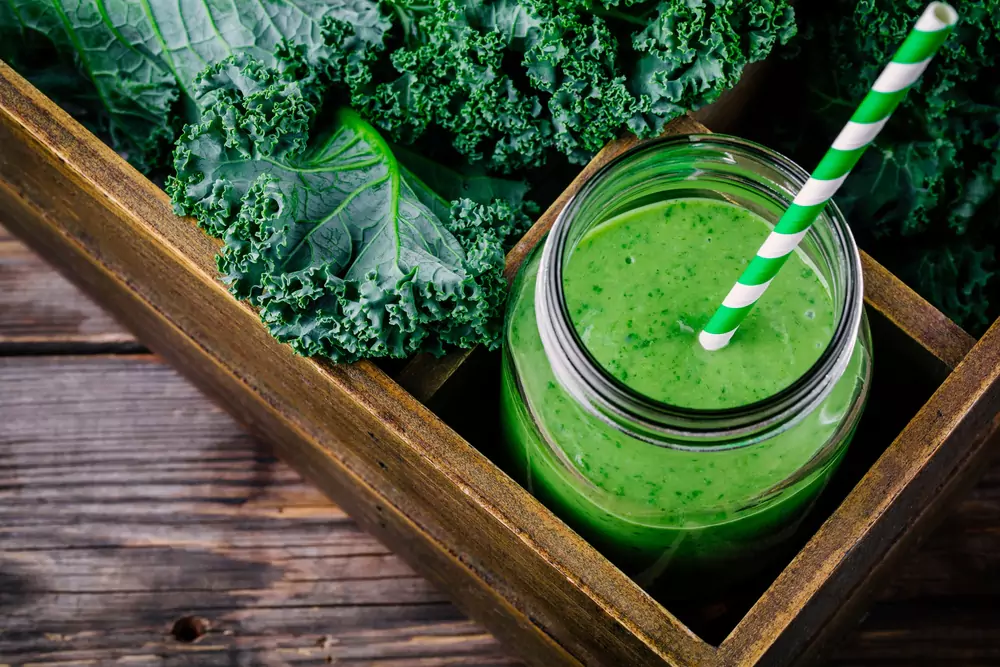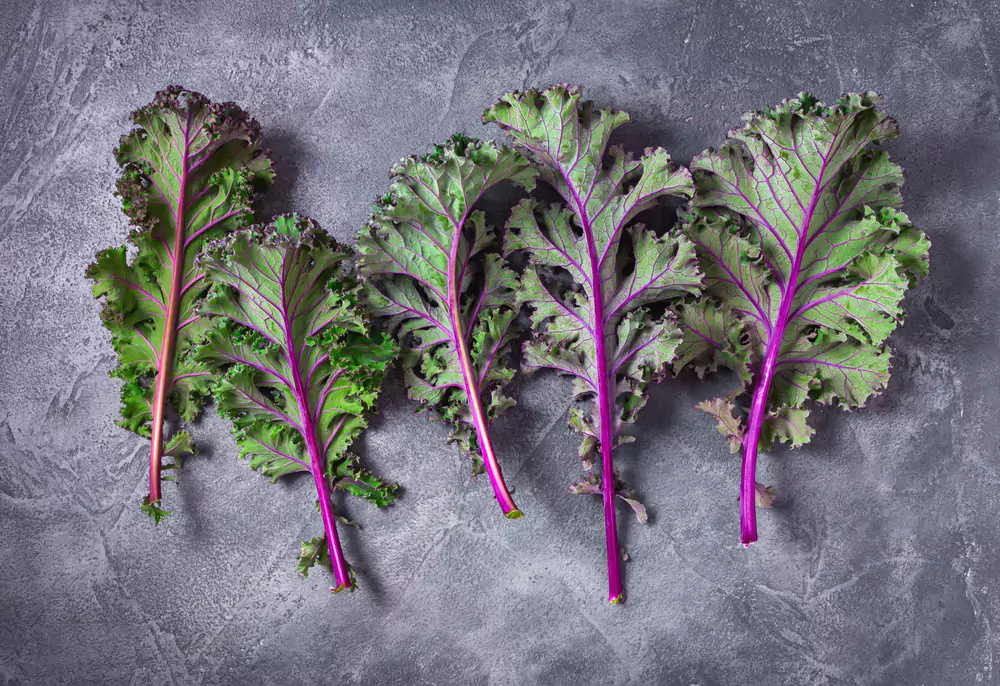Kale juice has gained popularity in recent years due to its numerous health benefits. Packed with essential nutrients, kale juice is a powerhouse of antioxidants, vitamins, and minerals that can contribute to overall well-being.
From supporting heart health to boosting the immune system, the benefits of kale juice are extensive. In this blog post, I will explore the various advantages of incorporating kale juice into your diet and how it can positively impact your health.
What Is Kale Juice?
Before you know what the benefits of kale are, do you know what kale juice is? Kale juice is a nutrient-dense beverage made from the leafy green vegetable kale. It is made by blending or juicing fresh kale leaves, resulting in a vibrant green liquid that is packed with vitamins, minerals, and antioxidants.
Kale juice is known for its potential health benefits, including supporting digestion, promoting heart health, and providing a concentrated source of essential nutrients. Incorporating kale juice into your diet can be a convenient way to boost your intake of important nutrients and contribute to overall well-being.
Nutritional Info – Kale
| Nutrient | Amount per 100g of Kale |
| Calories | 33 kcal |
| Carbohydrates | 6.9 g |
| Fiber | 2.4 g |
| Protein | 3.3 g |
| Fat | 0.9 g |
| Vitamin A | 2458 IU |
| Vitamin C | 132.6 mg |
| Vitamin E | 0.8 mg |
| Vitamin K | 1068 µg |
| Thiamin (B1) | 0.1 mg |
Is Kale Juice Good For You?

According to the latest research, kale juice can be a beneficial addition to a healthy diet. Kale is packed with essential nutrients such as vitamins A, C, and K, as well as minerals like calcium and potassium. Its high antioxidant content may contribute to reducing inflammation and lowering the risk of chronic diseases.
Additionally, kale juice is a convenient way to increase your daily intake of leafy greens, which are known for their numerous health benefits. However, it’s important to consume kale juice in moderation, as excessive intake may lead to certain health issues due to its high oxalate content.
Why To Juice With Kale – 9 Health Benefits Of Kale

Moving towards our main concern, the benefits of kale! The humble kale has gained immense popularity in recent years due to its numerous health benefits. This leafy green vegetable is packed with essential vitamins, minerals, and antioxidants that contribute to a healthy lifestyle. Here, we will explore nine health benefits of kale juice, with a focus on kale juice benefits for skin.
Rich in Vitamins and Minerals
Kale juice is an excellent source of vitamins A, C, and K. These vitamins play a crucial role in maintaining healthy skin, eyesight, and immune system function. Additionally, kale is rich in minerals such as calcium, potassium, and iron, which contribute to overall health and well-being.
Antioxidant Properties
Kale juice is loaded with powerful antioxidants, including beta-carotene, lutein, and zeaxanthin. These compounds help protect cells from damage caused by free radicals, which can lead to premature aging and various diseases. As a result, consuming kale juice can help improve skin health and reduce the signs of aging.
Detoxification Support
Kale juice contains compounds called glucosinolates, which have been shown to support liver detoxification. The liver plays a vital role in filtering toxins from the body, and by supporting liver function, kale juice can help improve overall health and well-being.
Anti-Inflammatory Benefits
Kale juice contains anti-inflammatory properties due to its high content of flavonoids and polyphenols. Inflammation is a natural response to injury or infection but can also contribute to chronic diseases. By reducing inflammation in the body, kale juice may help lower the risk of developing these conditions.
Improved Digestion
Kale juice is a good source of dietary fiber, which helps promote healthy digestion. Fiber aids in the proper functioning of the gastrointestinal tract and can help prevent constipation and other digestive issues.
Stronger Bones
Kale juice is rich in calcium and vitamin K, both of which are essential for maintaining healthy bones. These nutrients help support bone mineral density and reduce the risk of developing osteoporosis.
Blood Pressure Regulation
Kale juice contains potassium, which can help regulate blood pressure. Potassium helps balance the effects of sodium in the body and may help lower high blood pressure, reducing the risk of heart disease and stroke.
Weight Management
Benefits of kale juice for weight loss are immense and impressive. Kale juice is low in calories and high in fiber, making it an ideal choice for those looking to maintain a healthy weight. The fiber in kale juice can help promote feelings of fullness, reducing the temptation to overeat.
Improved Immune Function
Kale juice is rich in vitamin C, which is essential for a healthy immune system. Vitamin C helps protect the body against infections and supports the function of white blood cells, which are responsible for fighting off pathogens.
Types Of Kale
Now that you are familiar with the benefits of kale juice, here are some of its varieties to boost your nutritional intake. There are three main types of kale that you can incorporate into your diet, each with its own unique characteristics and health benefits.
Curly Kale

Curly kale is the most common and widely available type of kale. It gets its name from its frilly, curly leaves that are a deep green color. This type of kale is high in vitamins A, C, and K, as well as minerals like calcium and potassium. Curly kale is versatile in the kitchen and can be used in salads, smoothies, or cooked as a side dish. Its slightly bitter taste makes it a popular choice for those looking to add some variety to their diet.
Lacinato Kale

Also known as Tuscan kale or dinosaur kale, Lacinato kale is characterized by its long, narrow, and dark green leaves with a slightly ruffled appearance. This type of kale has a milder, sweeter flavor compared to curly kale, making it a great option for those who are new to the leafy green. Lacinato kale is high in vitamins A, C, and K, as well as antioxidants like beta-carotene and lutein. It is often used in Mediterranean dishes, such as soups, stews, and sautés, but can also be enjoyed raw in salads.
Red Russian Kale

Red Russian kale is a unique varietal with its dark red-purple stems and leaves that can range from deep green to purple. This type of kale has a mild, sweet flavor and a tender texture, making it an excellent choice for salads. Red Russian kale is high in vitamins A, C, and K, as well as antioxidants like kaempferol and quercetin. It is also a good source of dietary fiber, which can help support digestive health and aid in weight management.
3 Reasons Why Kale Juice Should Be Part Of Your Diet
Undoubtedly, the benefits of juicing kale and spinach or any other vegetable are immense, but here are three compelling reasons why kale juice should be a part of your diet:
Kale Juice: Strengthen Your Immune System
Kale is a nutritional powerhouse, packed with essential vitamins and minerals that can significantly boost your immune system. It is rich in vitamin C, an antioxidant that helps strengthen the immune system and fight off infections.
Additionally, kale contains high levels of vitamin A, which plays a crucial role in enhancing the body’s immune response. Regular consumption of kale juice can provide your body with the necessary nutrients to keep your immune system strong and resilient against illnesses.
Kale Juice: Strengthen Your Body
Incorporating kale juice into your diet can contribute to overall physical strength and vitality. Kale is an excellent source of iron, which is essential for the formation of hemoglobin and enzymes in the body. Iron helps transport oxygen to various parts of the body and supports muscle function, ultimately promoting strength and endurance.
Moreover, the presence of calcium in kale juice supports bone health and muscle function, further enhancing the body’s overall strength and resilience.
Kale Juice: Easily And Quickly Take Your Health To The Next Level
One of the most significant advantages of consuming kale juice is its ability to quickly elevate your health. With its dense concentration of nutrients, including vitamins K, C, and A, as well as minerals like manganese and copper, kale juice provides a convenient way to nourish your body with essential elements for optimal health.
Whether you are looking to improve digestion, enhance skin health, or boost energy levels, incorporating kale juice into your daily routine can efficiently take your health to the next level.
How To Make Kale Juice At Home?
As you are well aware of the benefits of kale juice, here is a step-by-step guide on how to make kale juice at home.
Ingredients:
- 1 bunch of kale (about 5-6 leaves)
- 1 apple, cored
- 1 lemon, peeled
- 1 inch ginger root
- 1 cup water (optional)
Instructions:
- Start by washing the kale leaves thoroughly. Remove the tough stems and discard them. Tear the leaves into smaller pieces.
- Assemble your juicer according to the manufacturer’s instructions. If you don’t have a juicer, you can use a blender and strain the juice through a cheesecloth or a nut milk bag.
- Begin by juicing the kale leaves. Push them through the juicer using a pusher or your hands. The leaves may be tough, so you might need to use some force.
- Next, juice the apple, lemon, and ginger. These ingredients will not only add flavor but also help in improving digestion and boosting immunity.
- If you find the juice too thick, you can add water to thin it out. Start with half a cup and taste the juice. Add more water if needed.
- If you use a blender, strain the juice through a cheesecloth or a nut milk bag to remove any pulp.
- Serve the kale juice immediately for the best taste and nutrition. You can store the leftover juice in an airtight container in the refrigerator for up to 24 hours.
Tips:
- For a sweeter taste, use a sweeter variety of apple like a Gala or Fuji.
- If you don’t like the taste of lemon, you can replace it with lime or omit it altogether.
- You can add a pinch of black pepper or cayenne pepper to aid digestion and improve nutrient absorption.
More Ways To Eat Kale
Other than juicing, there are several creative and delicious ways to incorporate kale into your diet. Here are three suggested ways to eat kale that are both enjoyable and nutritious:
Kale Chips
A popular snack among health enthusiasts, kale chips are easy to make at home and require just a few simple ingredients. Preheat your oven to 350°F (175°C). Rinse and dry a bunch of kale, then tear the leaves into bite-sized pieces. Place them on a baking sheet, drizzle with olive oil, and sprinkle with salt and any other desired seasonings. Bake for 10-15 minutes, or until the chips are crispy and slightly browned. This tasty and healthy snack is a great alternative to traditional chips and is packed with vitamins and minerals.
Kale Salad
A refreshing and filling option, kale salads can be customized to your liking with a variety of ingredients. Start by massaging the kale leaves with a simple dressing made from olive oil, lemon juice, and a pinch of salt. This helps to soften the kale and make it more palatable. Add in your choice of veggies, proteins, and grains, such as cherry tomatoes, cooked quinoa, and sliced chicken or tofu. Top with your favorite salad dressing and enjoy a satisfying and nutritious meal.
Kale Smoothie
Smoothies are a quick and easy way to incorporate kale into your daily routine. Combine a handful of washed and chopped kale with your choice of liquid (water, almond milk, or coconut water) and frozen fruit (such as berries, bananas, or mangoes) in a blender. Add a scoop of protein powder or a spoonful of nut butter for added nutrition and blend until smooth. This delicious and nutrient-packed smoothie is a great way to start your day or refuel after a workout.
Conclusion
In conclusion, kale juice is undeniably a nutrient-packed powerhouse that offers a myriad of health benefits. Its high concentration of vitamins, minerals, and antioxidants makes it an excellent addition to a balanced diet. Regular consumption of kale juice can contribute to improved digestion, strengthened immune function, and reduced risk of chronic diseases. Additionally, its anti-inflammatory properties and potential to support heart health further solidify its status as a superfood. Incorporating kale juice into your daily routine can be a simple yet effective way to boost your overall well-being.
FAQs
What Happens When You Drink Kale Everyday?
Drinking kale everyday can contribute to improved digestion, increased energy levels, and enhanced overall health due to its high nutrient content.
What Are 4 Benefits Of Kale?
Kale is rich in vitamins, minerals, and antioxidants, promoting heart health, aiding in digestion, supporting bone health, and boosting the immune system.
Does Kale Juice Detox Your Body?
Kale juice can aid in detoxifying the body due to its high fiber and water content, which can help flush out toxins.
Does Kale Help Clear Skin?
Kale is beneficial for skin health as it contains vitamins A, C, and K, which can help promote clear and radiant skin.
Is It Okay To Drink Kale Juice Everyday?
It is generally safe to drink kale juice everyday as part of a balanced diet, but moderation is key due to its high vitamin K content.
What Are Benefits Of Kale Juice In The Morning?
Drinking kale juice in the morning can provide a nutrient boost, aid in hydration, and support overall well-being throughout the day.
How Often Should You Drink Kale Juice?
It is recommended to drink kale juice in moderation, such as a few times per week, to avoid excessive intake of certain nutrients.
References:
American Heritage Vegetables: Kale
USDA National Nutrient Database: Kale, Raw
Linus Pauling Institute: Copper
Colorado State University Extension: Water-Soluble Vitamins: B-Complex and Vitamin C
Linus Pauling Institute: Vitamin C

![10 Best Fruits to Juice - [ Health Benefits and Nutritious Boost ] Best Fruits to Juice](https://juicerhunter.com/wp-content/uploads/2023/10/Best-Fruits-to-Juice-150x150.webp)




